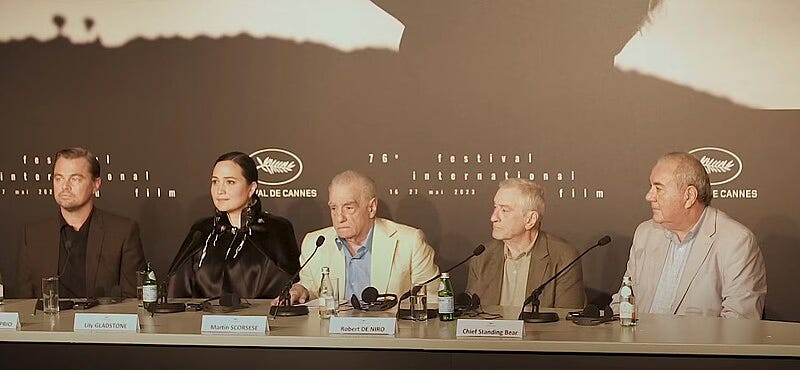
Yes, Lily Gladstone is as good as everyone says; yes, it justifies the 3.5-hour runtime; yes, you should see it on the big screen.
It’s been called Scorcese’s Western, but it’s also the closest he’s come to horror since 2010’s Shutter Island. De Niro’s William “King” Hale is an outright demonic figure, his avuncular persona and Southern charm masking not so much a dark soul as the absence of one entirely. Without delving into spoiler territory, the insidious manner in which he and his lackeys assert their influence over the Osage people is harrowing to watch. (On a side note, it’s such a delight seeing De Niro flexing again after 20 years of phoned-in cash grabs.)
Ultimately, the genre comparisons, whether Western, Horror, or Crime, sell the film short. Scorcese has been criticized (wrongly, in my view) in the past for glorifying violence, or at least for filming it with a style and flair that undercuts any critique implied by the film’s narrative. There can be no complaint of that here: the brutality (of which there is plenty) is presented in a starkly routine, almost procedural manner. The suspense lies not in any significant sense of mystery but instead in the crushingly inevitable banality of the violence and the helplessness of its victims.
This is not a ‘cool’ movie like Goodfellas. There is no good life here. This makes it an interesting film to place in the broader Scorcese canon. Thematically, it fits pretty neatly into the ‘American moral decline’ lineage that runs through Goodfellas, Casino, and Wolf of Wall Street, but tonally, it’s far closer to his quieter works, particularly his underrated 2016 epic Silence.
Perhaps inevitably, given his status as an elderly, legendary filmmaker, Scorcese’s recent films have each been contextualized as denouements to longer-running projects. Silence was viewed as the culmination of the religious trilogy that started with The Last Temptation of Christ, while The Irishman capped off his long-running obsession with the American mob. The consistency of Killers of the Flower Moon with these two previous films in style and tone recontextualizes them as something far more interesting. Far from spending his late career tying up loose ends, Scorcese has instead quietly produced a trilogy of meditative, personal, mature, devastating epics that stand alone as somber reflections on mortality, complicity, and the banality of structural violence. In 30 years, people will look back at this as one of the great cinematic runs of the 21st century.




I can't wait to see it (and then we can talk about it!) 💚 🥃